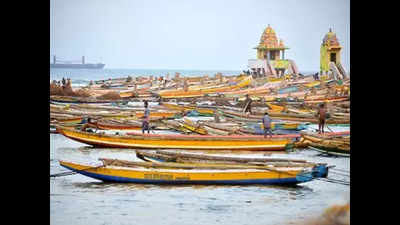- News
- City News
- Hyderabad News
- Sea warming: Andhra Pradesh fishermen struggle for a good catch
Trending
This story is from November 18, 2019
Sea warming: Andhra Pradesh fishermen struggle for a good catch
The fish population in the sea off Bay of Bengal is dwindling, forcing fishermen to spend more time on fishing expeditions.

Representative image
The fish population in the sea off Bay of Bengal is dwindling, forcing fishermen to spend more time on fishing expeditions.
M Bullayya, 45, in Visakhapatnam has a mechanized boat. Earlier, he and his seven-member crew used to spend three days on seas but now he is involved in ‘weekday fishing’. They set out every Monday and return on Fridays to ensure the catch is good enough.“On the last two occasions we went to Kalingapatnam and returned after 10 days.Then we went to Ganjam coastline near the Gopalpur Port in Odisha and returned after a fortnight. It seems fish have disappeared from sea off Bay of Bengal,” said Bullayya, sitting at the office of Dolphin Boat Operators' Welfare Association.
At Jodugullapalem on Beach Road lives A Raju and family. Raju, 53, ventures out into the sea every night in his boat. Like Bullayya, Raju too is spending more time on seas looking for a good catch. “I used to spend four to five hours. Now even after spending eight hours, the catch is low,” said Raju.
Spend an evening at Visakhapatnam harbor and you are sure to hear the echo of Bullayya and Raju’s voices among other 63,000 fishermen in the districts. Perhaps, the 3.8 lakh fishermen in nine coastal districts have the same woes.
A research by Dasu found that population of a few species of fish decreased by 60 to 90% in the last 10 years. “The fish population in Bay of Bengal has come down in the past few years,” said Dasu. Fishermen are changing the make and quality of nets. Earlier for hook-and-line fishing a fisherman used 200 metre-long nets. Now some are using 6,000-metre-long nets. “For gillnet fishing we use small live fish as baits to attract fish. Such practices are usual in fishing with rods. Now such techniques are yielding little results,” said Bullayya. After 1977, fishing in Vizag got commercialized after introduction of deep sea fishing. In three decades, it has affected fish population.
Environmentalist Sohan Hatangadi said discharge of waste into the sea played a big role. Industries towards the north of the city discharge waste into the sea. Within the city limits waste from households and restaurants go to the sea. On the southern side, port and shipyards, too, discharge waste into the sea regularly. “Waste should be treated. Greater Visakha Municipal Corporation is not equipped for proper waste management. The pollution control board has not enough manpower to keep a vigil on discharge of industrial waste,” said Hatangadi. The solution is restricting catch per boat and banning ring seine nets and bottom trawling nets.
M Bullayya, 45, in Visakhapatnam has a mechanized boat. Earlier, he and his seven-member crew used to spend three days on seas but now he is involved in ‘weekday fishing’. They set out every Monday and return on Fridays to ensure the catch is good enough.“On the last two occasions we went to Kalingapatnam and returned after 10 days.Then we went to Ganjam coastline near the Gopalpur Port in Odisha and returned after a fortnight. It seems fish have disappeared from sea off Bay of Bengal,” said Bullayya, sitting at the office of Dolphin Boat Operators' Welfare Association.
At Jodugullapalem on Beach Road lives A Raju and family. Raju, 53, ventures out into the sea every night in his boat. Like Bullayya, Raju too is spending more time on seas looking for a good catch. “I used to spend four to five hours. Now even after spending eight hours, the catch is low,” said Raju.
Spend an evening at Visakhapatnam harbor and you are sure to hear the echo of Bullayya and Raju’s voices among other 63,000 fishermen in the districts. Perhaps, the 3.8 lakh fishermen in nine coastal districts have the same woes.
Although marine landing in the state has showed a steady growth in the past few years, fishermen in Vizag are struggling as there is less fish now. “Earlier there were good catch five to 10 nautical miles off the coastline. Now one has to go at least 30 nautical miles. Yet there is no guarantee that the catch would be good,” said Arjilli Dasu, executive director, Fisherfolk Foundation, a community-based organization for fishermen.
A research by Dasu found that population of a few species of fish decreased by 60 to 90% in the last 10 years. “The fish population in Bay of Bengal has come down in the past few years,” said Dasu. Fishermen are changing the make and quality of nets. Earlier for hook-and-line fishing a fisherman used 200 metre-long nets. Now some are using 6,000-metre-long nets. “For gillnet fishing we use small live fish as baits to attract fish. Such practices are usual in fishing with rods. Now such techniques are yielding little results,” said Bullayya. After 1977, fishing in Vizag got commercialized after introduction of deep sea fishing. In three decades, it has affected fish population.
Environmentalist Sohan Hatangadi said discharge of waste into the sea played a big role. Industries towards the north of the city discharge waste into the sea. Within the city limits waste from households and restaurants go to the sea. On the southern side, port and shipyards, too, discharge waste into the sea regularly. “Waste should be treated. Greater Visakha Municipal Corporation is not equipped for proper waste management. The pollution control board has not enough manpower to keep a vigil on discharge of industrial waste,” said Hatangadi. The solution is restricting catch per boat and banning ring seine nets and bottom trawling nets.
End of Article
FOLLOW US ON SOCIAL MEDIA











